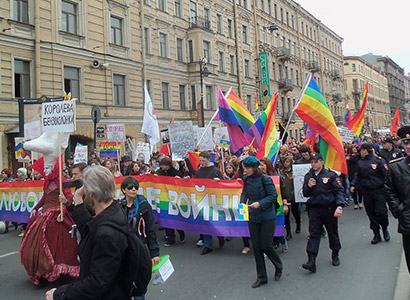European Human Rights Court fines Russia for banning gay Prides

Members of the LGBT community take part in a 2014 anti-war demonstration in Saint Petersburg
The European Court of Human Rights has found that Russia contravened the human rights of its citizens by banning LGBT Pride parades. But will it make any difference?
On Tuesday, the court ruled in favour of 23 applicants from different parts of Russia who claimed that local authorities had imposed severe restrictions on peaceful assemblies planned by them, without any proper justification.
The series of blocked protests in the case included a gay pride march and meeting in the centre of St Petersburg on 26 June 2010 and a gay pride march and meeting in St Petersburg on 25 June 2011.
The court found “the authorities had placed such severe limitations on the applicants’ plans for public events, they had violated the applicants’ right to freedom of assembly.”
It noted that the events were often not banned outright but had severe and inflexible restrictions placed on them, such as limiting the dates and locations to the point that the events were pointless.
The court noted that “the right to freely assemble includes the right to choose the time, place and manner of conduct of the assembly…”
It further ruled that that the restrictions imposed on the demonstrations and events were “disproportionate and unjustified”.
Russia was ordered to pay the applicants a total 160,450 euros in damages and 11,600 euros in costs and expenses.
While the country is expected to pay the fines, the ruling is unlikely to have any effect on the continued barring of LGBT events and Pride parades.
In 2010, the same court fined fined Russia for blocking gay parades in Moscow, and ruled that activist and Pride organiser Nikolai Alexeyev had been discriminated against because of his sexual orientation.
Moscow city authorities simply brushed off the ruling and have continued to disallow Pride events from going ahead on an annual basis, arresting activists who attempt to go ahead with the events.
Pride parades have in recent years been banned on the basis of the 2013 law signed by President Putin prohibiting the promotion of “non-traditional” sexual relationships. The “gay propaganda” law effectively bars any expression or discussion of homosexuality in public, on television, in print or on the internet.
The law has been blamed for increased anti-gay sentiment, discrimination and violence against members of the LGBT community.
Leave a Reply